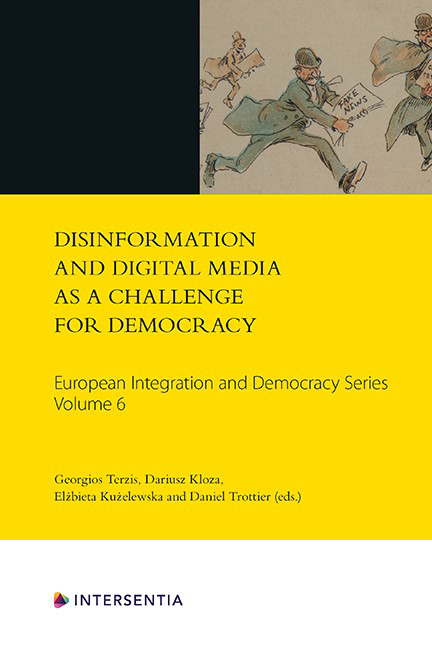Book contents
- Frontmatter
- Foreword: Fooling All of the People All of the Time: Democracy in the Age of Fake News
- Introduction: ‘They All Hear “Ping” at the Same Time’
- Contents
- List of Abbreviations
- List of Contributors
- PART I THEORETICAL APPROACHES TO AND THE CONCEPTUALISATION OF DISINFORMATION
- PART II EXPERIENCE OF DEALING WITH DISINFORMATION
- PART III SOLUTIONS TO DEAL WITH DISINFORMATION AND THEIR CRITIQUE
9 - The Scourge of Fake News in Greece
Published online by Cambridge University Press: 26 May 2021
- Frontmatter
- Foreword: Fooling All of the People All of the Time: Democracy in the Age of Fake News
- Introduction: ‘They All Hear “Ping” at the Same Time’
- Contents
- List of Abbreviations
- List of Contributors
- PART I THEORETICAL APPROACHES TO AND THE CONCEPTUALISATION OF DISINFORMATION
- PART II EXPERIENCE OF DEALING WITH DISINFORMATION
- PART III SOLUTIONS TO DEAL WITH DISINFORMATION AND THEIR CRITIQUE
Summary
INTRODUCTION
’Avrianismos’ is a term that comes from one of Greece's most popular newspapers of the 1980s and 1990s. The Avriani newspaper was often accused of wrongfully targeting politicians and other public figures, and doing so in an opportunistic way, meaning that it would support a political party according to its current interests. Nowadays, the definition of ‘Avrianismos’ could simply be put as ‘journalistic populism’. And where there is populism, fake news – especially that which is based on common misconceptions and prejudice – tends to thrive. In the age of information overload, the problem has exacerbated:
In the late 1980s, the first private television stations were established in Greece allowing people to express their opinions, which would not be expressed otherwise that freely. However, this situation also allowed people with extreme or absurd opinions to express themselves. In this framework, some fans of conservatism in Greece, who identified with the right-wing, extreme-right, even centre-right political parties in Greece, took advantage of the concept of Greek civilization superiority. They have been appearing in private television aiming at justifying that position, by stressing the risk of the Greek civilization being threatened by many enemies, each for their own reasons.
Since the beginning of the financial slump in Greece press freedom has worsened. A previously rather unknown but long history of state intervention in the media, censorship, and interplay between major media magnates and government officials has become apparent.
The quality and influence of mainstream media has deteriorated, especially since 2010 and the beginning of the economic crisis in Greece. Many printed media and some TV stations went bankrupt, while others (including digital media) had to adapt to the new economic conditions by laying offexperienced journalists and hiring inexperienced ones in their place, who were tasked to ‘produce’ as many articles as possible, either by translating foreign tabloids or by copying content from others. This leftno room for fact-checking and, as a result, even mainstream media reproduce fake stories from abroad. However, some benefited from this change, especially those that offered populist and unprofessional content, by becoming Greece's equivalent of British tabloids such as The Sun and the Daily Mail .
- Type
- Chapter
- Information
- Disinformation and Digital Media as a Challenge for Democracy , pp. 161 - 178Publisher: IntersentiaPrint publication year: 2020



